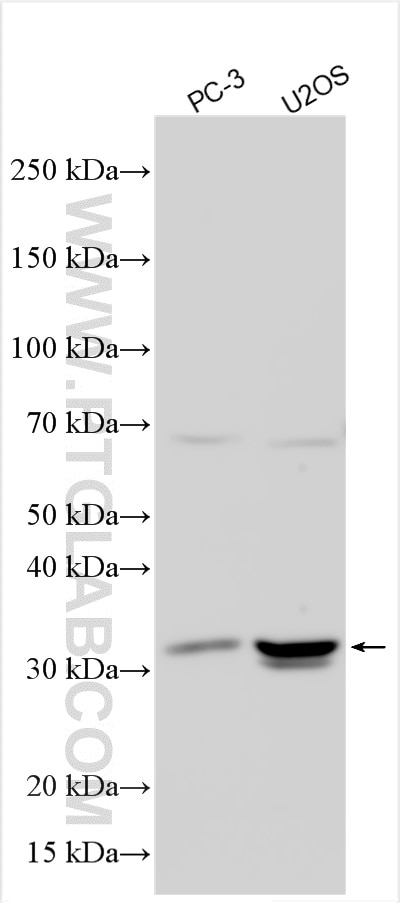SLC39A1/ZIP1 Polyklonaler Antikörper
SLC39A1/ZIP1 Polyklonal Antikörper für WB, ELISA
Wirt / Isotyp
Kaninchen / IgG
Getestete Reaktivität
human
Anwendung
WB, ELISA
Konjugation
Unkonjugiert
Kat-Nr. : 26799-1-AP
Synonyme
Geprüfte Anwendungen
| Erfolgreiche Detektion in WB | PC-3-Zellen, U2OS-Zellen |
Empfohlene Verdünnung
| Anwendung | Verdünnung |
|---|---|
| Western Blot (WB) | WB : 1:1000-1:4000 |
| It is recommended that this reagent should be titrated in each testing system to obtain optimal results. | |
| Sample-dependent, check data in validation data gallery | |
Produktinformation
26799-1-AP bindet in WB, ELISA SLC39A1/ZIP1 und zeigt Reaktivität mit human
| Getestete Reaktivität | human |
| Wirt / Isotyp | Kaninchen / IgG |
| Klonalität | Polyklonal |
| Typ | Antikörper |
| Immunogen | SLC39A1/ZIP1 fusion protein Ag24937 |
| Vollständiger Name | solute carrier family 39 (zinc transporter), member 1 |
| Berechnetes Molekulargewicht | 324 aa, 34 kDa |
| Beobachtetes Molekulargewicht | 34 kDa |
| GenBank-Zugangsnummer | BC003152 |
| Gene symbol | SLC39A1 |
| Gene ID (NCBI) | 27173 |
| Konjugation | Unkonjugiert |
| Form | Liquid |
| Reinigungsmethode | Antigen-Affinitätsreinigung |
| Lagerungspuffer | PBS with 0.02% sodium azide and 50% glycerol |
| Lagerungsbedingungen | Bei -20°C lagern. Nach dem Versand ein Jahr lang stabil Aliquotieren ist bei -20oC Lagerung nicht notwendig. 20ul Größen enthalten 0,1% BSA. |
Hintergrundinformationen
SLC39A1, also known as ZIP1, is a member of the zinc-iron permease family. It is localized to the cell membrane and acts as a zinc uptake transporter. SLC39A1 mediates the influx of Zn2+ into cells from extracellular space(PMID: 16844077).SLC39A1 is the major importer of zinc from circulating blood plasma into prostate cells (PMID: 12888280). In mesenchymal stem cells (MSCs), ZIP1 may exist as a dimer with a molecular weight of 70kD(PMID:16203195).
Protokolle
| PRODUKTSPEZIFISCHE PROTOKOLLE | |
|---|---|
| WB protocol for SLC39A1/ZIP1 antibody 26799-1-AP | Protokoll herunterladen |
| STANDARD-PROTOKOLLE | |
|---|---|
| Klicken Sie hier, um unsere Standardprotokolle anzuzeigen |


